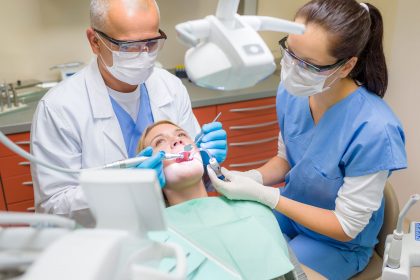It takes four years of graduate school to earn a doctoral degree in general dentistry. Many dentists, though, choose to pursue specialties requiring an additional two, three, or even six years of education and hands-on training.
Beyond general dentistry, the ADA recognizes twelve dental specialties: Anesthesiology; Public Health; Endodontics; Oral and Maxillofacial Pathology, Radiology, and Surgery; Oral Medicine; Orofacial Pain; Orthodontics and Dentofacial Orthopedics; Pediatric Dentistry; Periodontics; and Prosthodontics.
A general dentist is the person to see for routine maintenance, checkups, and basic dental work. General dentists have a wide range of knowledge over many dental subjects, but a specialist has deep knowledge in one particular field. A general dentist might refer you to a dental specialist if your condition warrants it.
Dental specialties
Dental anesthesiology
A dental anesthesiologist specializes in providing advanced pain management and anesthesia during dental surgical procedures. They work in dental and hospital settings, providing anesthesia for complicated dental cases and for patients with special needs, post-traumatic stress disorder, and dental phobia.
Specialization as a dental anesthesiologist requires additional post-doctoral training and residency of two to three years.
Dental public health
Dental public health is not a specialization intended to work directly with patients. Instead, a dental public health specialist works to promote oral health through organized community efforts. They work with local and national governments to participate in policy decisions and educate both the public and other healthcare professionals on issues of concern related to the practice of dentistry.
A masters or doctorate degree in dental public health is required for this specialization, with coursework in biostatistics, epidemiology, health care policy, environmental health, and behavioral sciences.
Endodontics
Endodontists specialize in the innermost layer of the tooth: the pulp that contains the tooth’s nerves. An endodontist’s training makes them experts in diagnosing tooth pain and in providing root canal treatment. While a general dentist is qualified to perform a root canal, endodontists are much more practiced and expert in the procedure. Seeing an endodontist for a root canal is a great idea if your case is advanced or if you have any concerns that this might be a painful procedure.
A dentist must complete an additional two-year residency to qualify as an endodontic specialist.
Oral and maxillofacial pathology
An oral and maxillofacial pathologist is expert in identifying, managing, and treating diseases that affect the oral and maxillofacial regions. These specialists use clinical, microscopic, biochemical, radiographic, and other techniques to research and diagnose diseases that start in the mouth and jaw.
Post-doc training and education as an oral and maxillofacial pathologist can take 37 months.
Oral and maxillofacial radiology
Oral and maxillofacial radiologists specialize in producing and interpreting the images used for identification and management of oral and maxillofacial diseases, disorders, and conditions. While typical dental radiographs can be performed by general dentists, hygienists, and many dental assistants, an oral an maxillofacial radiologist is able to safely take more advanced images, such as of other areas of the skull, the temporomandibular joint (TMJ), and many others.
The specialty requires two years of post-doctoral education.
Oral and maxillofacial surgery
An oral and maxillofacial surgeon is a dentist specializing in diagnosis and surgical treatment of the hard and soft tissues of the face, head, neck, and jaw.
To obtain an oral and maxillofacial surgery specialty, an additional four years of hospital-based surgical residency is required.
Oral medicine
Oral medicine is a specialty focused on diagnosis and management of oral health issues with medically complex patients. These are patients with underlying medical conditions affecting their oral health and the delivery of dental care.
Training as an oral medicine specialist requires a minimum post-doc residency of 24 months.
Orofacial pain
An orofacial pain specialist diagnoses and treats pain in the jaw, mouth, face, head, and neck. Referrals are made to an orofacial pain specialist when the source of the pain is not obvious. An orofacial pain specialist’s deep knowledge of neuropathic pain, neurovascular pain, cervical pain, musculoskeletal pain, and even sleep disorders allow for a much more thorough investigation and treatment options.
Certification requires completion of a two-year, full-time orofacial pain management program.
Orthodontics and dentofacial orthopedics
Orthodontics involves the management of tooth movement for functional and aesthetic improvements. Dentofacial orthopedics guides facial development and growth to ensure proper jaw alignment.
Advanced training for certification in orthodontics and dentofacial orthopedics takes between 24 and 36 months.
Pediatric dentistry
Pediatric dentists focus on oral health care for infants through adolescent children.
To become a pediatric dentist, you must complete a two to three year post-doc residency program.
Periodontics
Periodontists focus on treating the tissues that support and surround the teeth. This specialization deals with gum disease. Services include regenerative procedures to stimulate growth of bone and tissue, crown lengthening, implants, and laser treatments.
Periodontists need an additional three years of education beyond dental school.
Prosthodontics
A prosthodontist specializes in treating problems related to missing teeth and jaw structures. They are highly skilled in providing implants, dentures, bridges, and crowns.
After completing dental school, prosthodontists must complete three years of additional residency training.
You’re in good hands
Whatever your needs, whether you’re visiting a generalist or a specialist, you can be sure that a licensed dentist is a well-trained professional who has spent many years studying, learning, and training to master the art and skills of dentistry.




